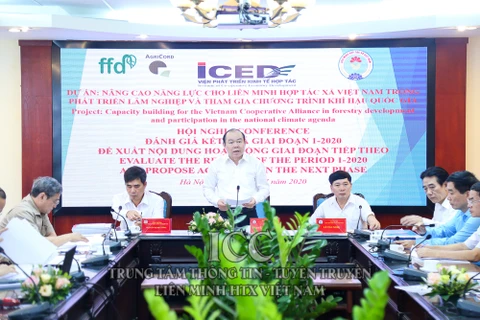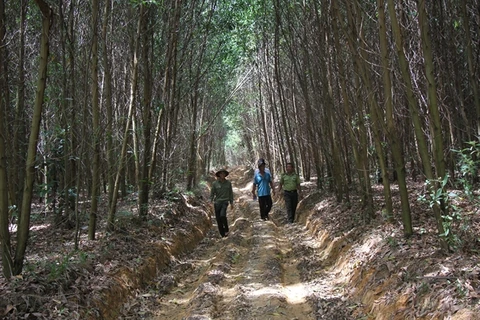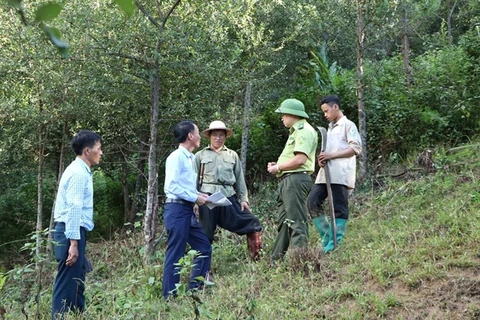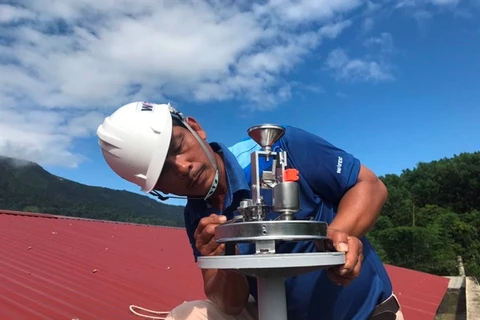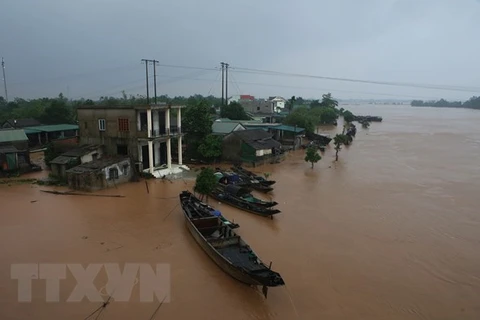Thanh Hoa (VNS/VNA) - Young people from the border district of Muong Lat in Thanh Hoa province have been planting protective forests to limit the increasing risk of landslides.
The project has both brought economic benefits to growers and contributed to increasing forest coverage on barren hills.
The volunteers have so far planted 200ha of forest, and many households have benefited with incomes of 80 million VND (3,400 USD) -200 million VND (8,620 USD) per year.
Ha Van Diep, a Thai ethnic minority man living in Lat village, Tam Chung commune, was born into a poor family. After leaving high school, he had to work as a labourer just to get by.
In 2016, the Muong Lat district Youth Union told him about an economic development plan for the forest, and he decided to sign up.
He started off by borrowing 40 million VND from the Bank for Social Policies in the district and from friends to import different varieties of plants and trees. He also turned unused land into a forest for breeding pigs, chickens and cows which earns him tens of millions of dong per year.
He said he realised that if the trees kept falling, the forest would disappear - and that natural disasters, like floods and drought, could become worse.
“Floods, especially flash floods, happen frequently in this area,” he said. “Afforestation on the bare hills is contributing to regulating water sources and limiting soil erosion and flash floods.”
His work is carefully planned. He plants different trees in layers so the high trees create shade for the fruit trees.
His forest is growing day by day with a current area of about 8 hectares. He now has five cows, 20 pigs, 15 goats and numerous chickens.
His family's income has reached 200 million VND per year.
Besides his business, Diep is also an active member of the local Youth Union. Together with local youths, he lends a hand to help families upgrade their houses before storms hit the region.
He also shows young people how to start their own businesses and alleviate poverty.
Ha Van Tinh, another Thai ethnic minority man living in Chien Cong village, Muong Lat township, was also a pioneer in the local afforestation movement.
Born into a poor family living on the banks of the Ma River, Tinh spent his childhood in poor conditions and constantly hungry.
In 2018, realising that afforestation contributed to mitigating climate change and combating flash floods and landslides, Tinh decided to plant large trees for economic development and natural disaster prevention.
He spent the money he borrowed from the district Bank for Social Policies to buy seeds and seedlings of trees such as xoan and lat.
His plan to cultivate large trees combined with breeding cows and pigs has been developing day by day, bringing him a high and stable income of 170 million VND per year.
He also teaches young people about science and protecting the forests.
During the COVID-19 pandemic, he has encouraged people living in border areas to wear masks, wash their hands and disinfect their homes to prevent the spread of the pandemic.
Secretary of the district's Youth Union Lau Van Phia said since 2017, Thanh Hoa's Department of Agriculture and Rural Development had been donating seedlings and organising technical training courses.
The local Youth Union plans to continue its support for its members and young people to develop economic afforestation, especially among the H'Mong and Kho Mu ethnic groups./.
The project has both brought economic benefits to growers and contributed to increasing forest coverage on barren hills.
The volunteers have so far planted 200ha of forest, and many households have benefited with incomes of 80 million VND (3,400 USD) -200 million VND (8,620 USD) per year.
Ha Van Diep, a Thai ethnic minority man living in Lat village, Tam Chung commune, was born into a poor family. After leaving high school, he had to work as a labourer just to get by.
In 2016, the Muong Lat district Youth Union told him about an economic development plan for the forest, and he decided to sign up.
He started off by borrowing 40 million VND from the Bank for Social Policies in the district and from friends to import different varieties of plants and trees. He also turned unused land into a forest for breeding pigs, chickens and cows which earns him tens of millions of dong per year.
He said he realised that if the trees kept falling, the forest would disappear - and that natural disasters, like floods and drought, could become worse.
“Floods, especially flash floods, happen frequently in this area,” he said. “Afforestation on the bare hills is contributing to regulating water sources and limiting soil erosion and flash floods.”
His work is carefully planned. He plants different trees in layers so the high trees create shade for the fruit trees.
His forest is growing day by day with a current area of about 8 hectares. He now has five cows, 20 pigs, 15 goats and numerous chickens.
His family's income has reached 200 million VND per year.
Besides his business, Diep is also an active member of the local Youth Union. Together with local youths, he lends a hand to help families upgrade their houses before storms hit the region.
He also shows young people how to start their own businesses and alleviate poverty.
Ha Van Tinh, another Thai ethnic minority man living in Chien Cong village, Muong Lat township, was also a pioneer in the local afforestation movement.
Born into a poor family living on the banks of the Ma River, Tinh spent his childhood in poor conditions and constantly hungry.
In 2018, realising that afforestation contributed to mitigating climate change and combating flash floods and landslides, Tinh decided to plant large trees for economic development and natural disaster prevention.
He spent the money he borrowed from the district Bank for Social Policies to buy seeds and seedlings of trees such as xoan and lat.
His plan to cultivate large trees combined with breeding cows and pigs has been developing day by day, bringing him a high and stable income of 170 million VND per year.
He also teaches young people about science and protecting the forests.
During the COVID-19 pandemic, he has encouraged people living in border areas to wear masks, wash their hands and disinfect their homes to prevent the spread of the pandemic.
Secretary of the district's Youth Union Lau Van Phia said since 2017, Thanh Hoa's Department of Agriculture and Rural Development had been donating seedlings and organising technical training courses.
The local Youth Union plans to continue its support for its members and young people to develop economic afforestation, especially among the H'Mong and Kho Mu ethnic groups./.
VNA

